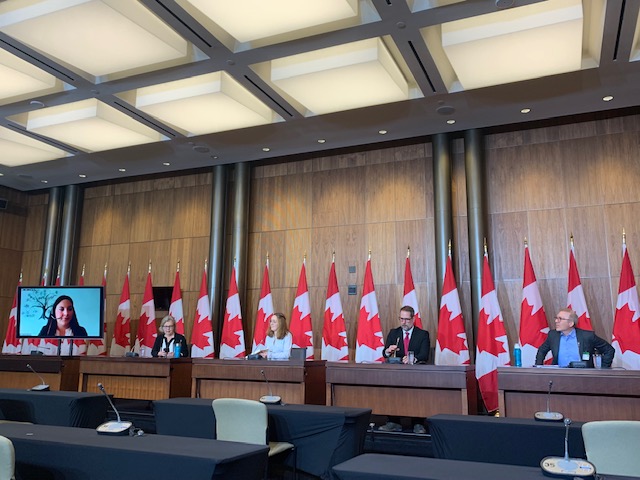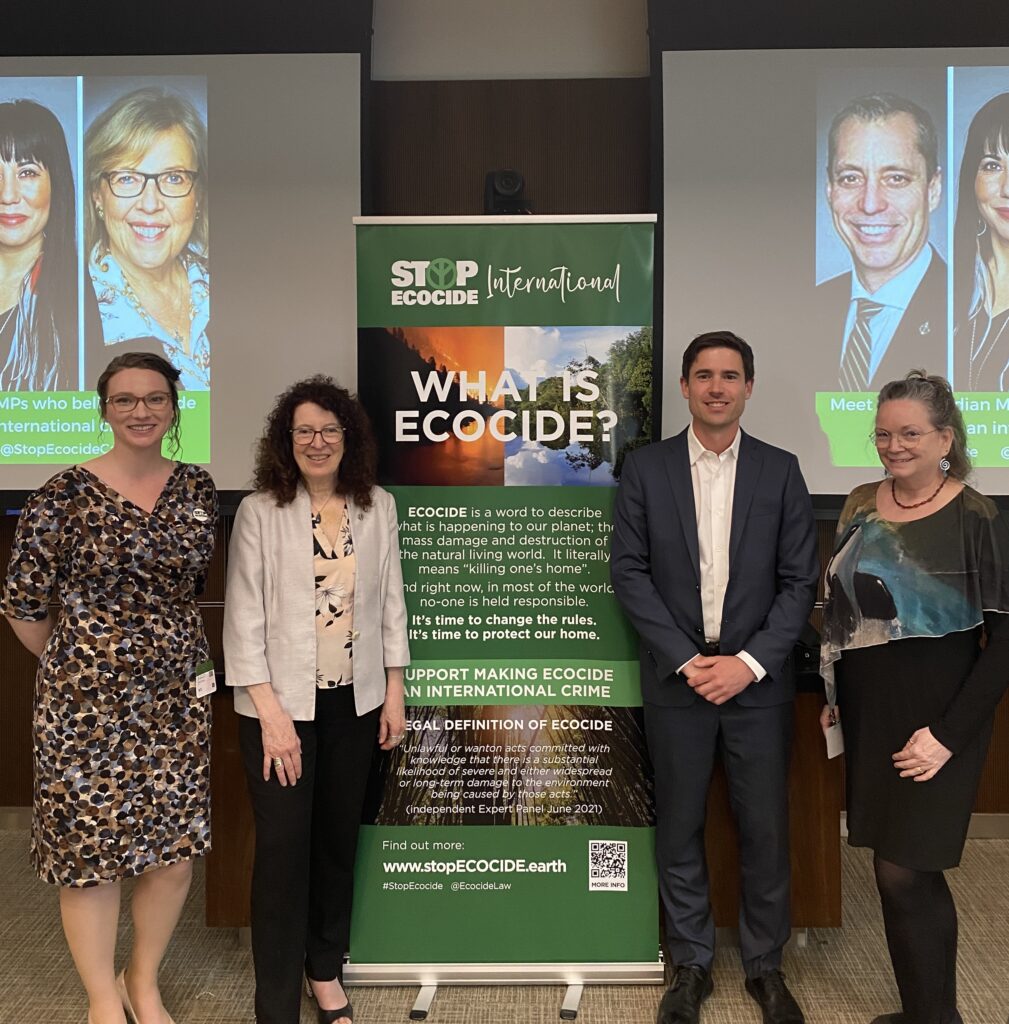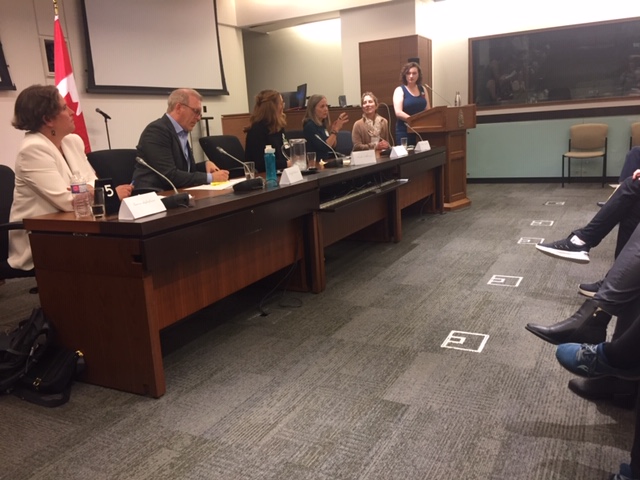Activating a Law to Protect the Earth
The absence of international laws against massive environmental damage sends a signal that it’s acceptable. Stop Ecocide Canada aims to establish ecocide as an international crime, filling the accountability gap for severe environmental harm. Canada is urged to lead in recognizing ecocide as a crime, aligning with its commitment to environmental protection and human rights.
“The function of law, in part, is to change consciousness, and the absence of any international crime concerning massive damage to the environment basically sends a signal that it’s OK to do that.”
Phillip Sands international lawyer and co-chair for the Independent Expert Panel for the Legal Definition of Ecocide.
Mass damage and destruction of ecosystems or ECOCIDE has been committed with impunity over decades and is a root cause of the global climate and ecological crisis. Yet most serious environmental damage is not defined as criminal under international law.
Stop Ecocide Canada, the Canadian arm of Stop Ecocide International, is seeking to change this by developing cross-sector national and global support for the establishment of an international crime of ecocide. The main route that Stop Ecocide Canada is pursuing to achieve this is an amendment to the Rome Statute of the International Criminal Court (ICC). In addition, and in the meantime, many activists are seeking to have ecocide recognized as a crime in as many national legal systems as possible, creating an “ecocide law wave”.

Recognizing a crime of ecocide would help to fill this critical accountability gap by providing an avenue for individual criminal responsibility at the international level for the most serious harms to the environment. Establishing this clear legal boundary could have a significant positive impact on corporate and governmental decision-making and provide an important guardrail against future widespread damage to the environment.
A growing number of States, international organizations, business entities and other stakeholders agree that ecocide should be recognized as a serious international crime. Stop Ecocide Canada seeks to provide the ICC – an independent, permanent court of last resort – with jurisdiction to investigate and prosecute ecocide as among the most serious crimes of international concern, alongside genocide, war crimes, crimes against humanity and the crime of aggression. In addition, member states and other countries can incorporate this crime into legislation in their own systems, thus creating a coherent law across borders.
As a major supporter of the ICC and a purported leader on climate and environmental stewardship, Canada has an important role to play. Canada played a pivotal role in the establishment of the ICC and became the first country in the world to incorporate the obligations of the ICC’s Rome Statute into its national laws. Canada could play a similar leadership role by supporting recognition of an international crime of ecocide.
Canada has already demonstrated a political will to enhance environmental protection through the rule of law. Canada supported the landmark declaration in 2022 by the UN General Assembly which recognizes access to a clean, healthy and sustainable environment as a universal human right. In June 2023, important changes were made to the Canadian Environmental Protection Act to enshrine recognition of the right to a healthy environment into law.

Co-sponsored by Monique Pauze (Bloc); Patrick Weiler (Liberals) Elizabeth May (Greens); Alexandre Boulerice (NDP).
There is a need now to enact measures to expand accountability for severe environmental damage through the criminalization of ecocide.
Since its establishment in 2020, Stop Ecocide Canada has engaged with Members of Parliament, Senators, government officials, indigenous leaders, lawyers, youth activists, academics and business leaders, galvanizing a national conversation around ecocide and highlighted the potential for Canada to play a lead role in support for the recognition of ecocide as an international crime.
We have engaged across three areas:
1. Building political will: In November 2022 we hosted the first ever cross party Parliamentary Press Conference on the criminalization of ecocide and Canada’s potential role, which was followed by a panel discussion with youth leaders and legal experts. In May 2023 we returned to Parliament with an expert panel discussion focused on the impact of a law of ecocide on business and finance. These events were sponsored by MPs from four federal parties as well as the Canadian Partnership for International Justice.
2. Grassroots campaigning through the facilitation and production of a series of webinars connecting diverse stakeholders in discussion on ecocide-related issues such as environmental racism; indigenous sovereignty and ecocide law; frontline defenders and ecocide law. “Podcasts for the Planet ” is a series featuring high-profile guests which explore key themes in ecology, ethics, law, finance and more at this unique moment of crisis and change for humanity. In addition, SEC energized a core team of volunteers across the country to work together in delivering on a strategy to build support within Canada for the criminalization of ecocide.
3. Legal research and advocacy: Our legal and policy advisory team has engaged in discussions on legal aspects of the crime of ecocide, partnering with the Canadian Partnership for International Justice across a series of events. The team has published a series of briefs and articles, and contributed to international law symposia such as the annual conference of the Canadian Council on International Law and UCLA Promise Institute for Human Rights’ Symposium on ‘An International Crime of Ecocide: New Perspectives’.

Professor Fannie LaFontaine Laval University; Professor Darryl Robinson Queens University; Amalie Wilkinson, Youth for Ecocide Law co-lead; Lisa Oldring Lawyer, International Human Right; Dona Grace-Campbell National Director.
Profound changes are needed if we are to move into a safe operating space for humanity. Ecocide law can support those changes, leveling the playing field for solutions – such as regenerative farming, renewable energy, circular economy – while providing a guardrail to ensure best practices.
Criminalizing ecocide makes serious harm to nature legally and morally unacceptable, preventing finance from flowing to practices that destroy ecosystems. It stimulates innovation in a healthy direction. It has the power to shift cultural assumptions and our understanding of our place in the natural world and our responsibility towards it, while encouraging governments and businesses to take environmental law and due diligence seriously.
In light of the urgency of the triple planetary crisis, the momentum to recognize grave harm to the environment as a crime of ecocide is welcome.

















